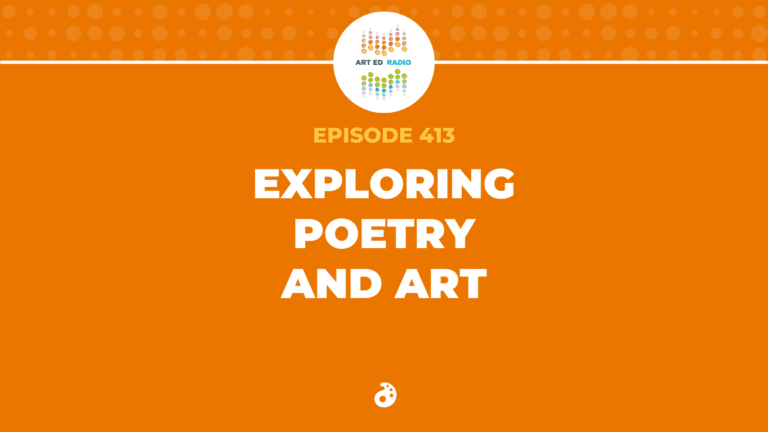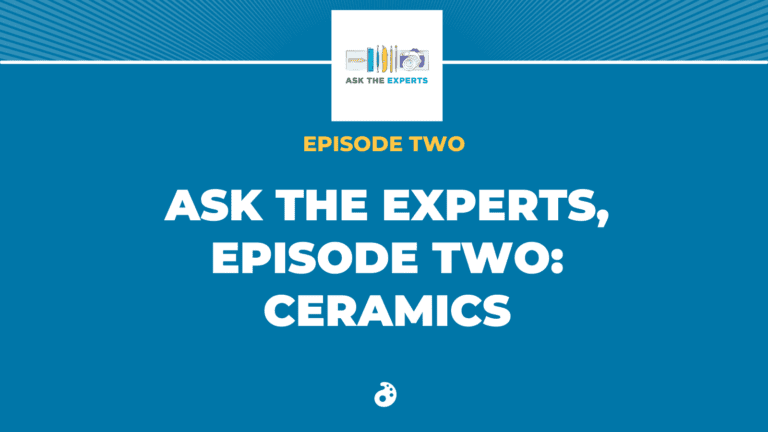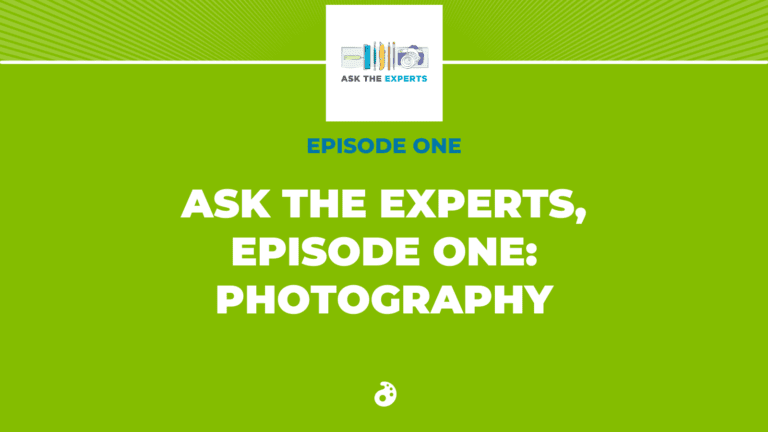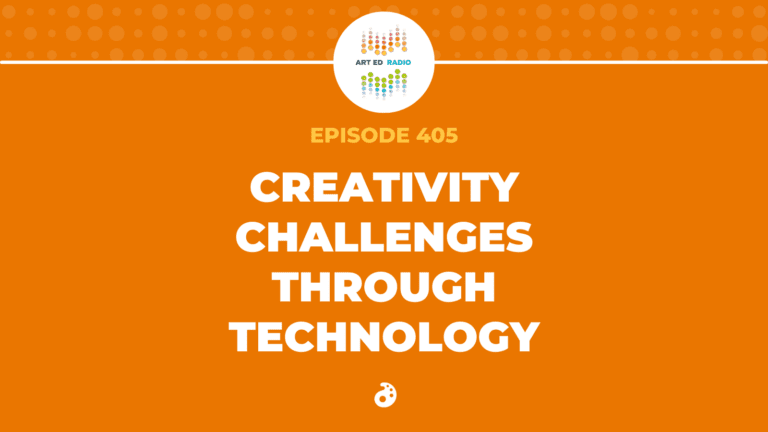Following last week’s mailbag episode, Tim spends some time ruminating on why teachers need to take a break this summer. With so many teachers feeling exhausted, he talks about the benefits to stepping away and the reasons you should take a break from school-related work for a couple of months. Listen as he discusses creating a routine around what you love, exploring new ideas that excite you, and the benefits of making more connections with the people who can support you. Full episode transcript below.
Resources and Links
- Challenges From This Year and How Art Teachers Overcame Them
- Read Abby Schukei’s article about Focusing on Yourself
- How to Reduce Stress and Take Things Off Your Plate
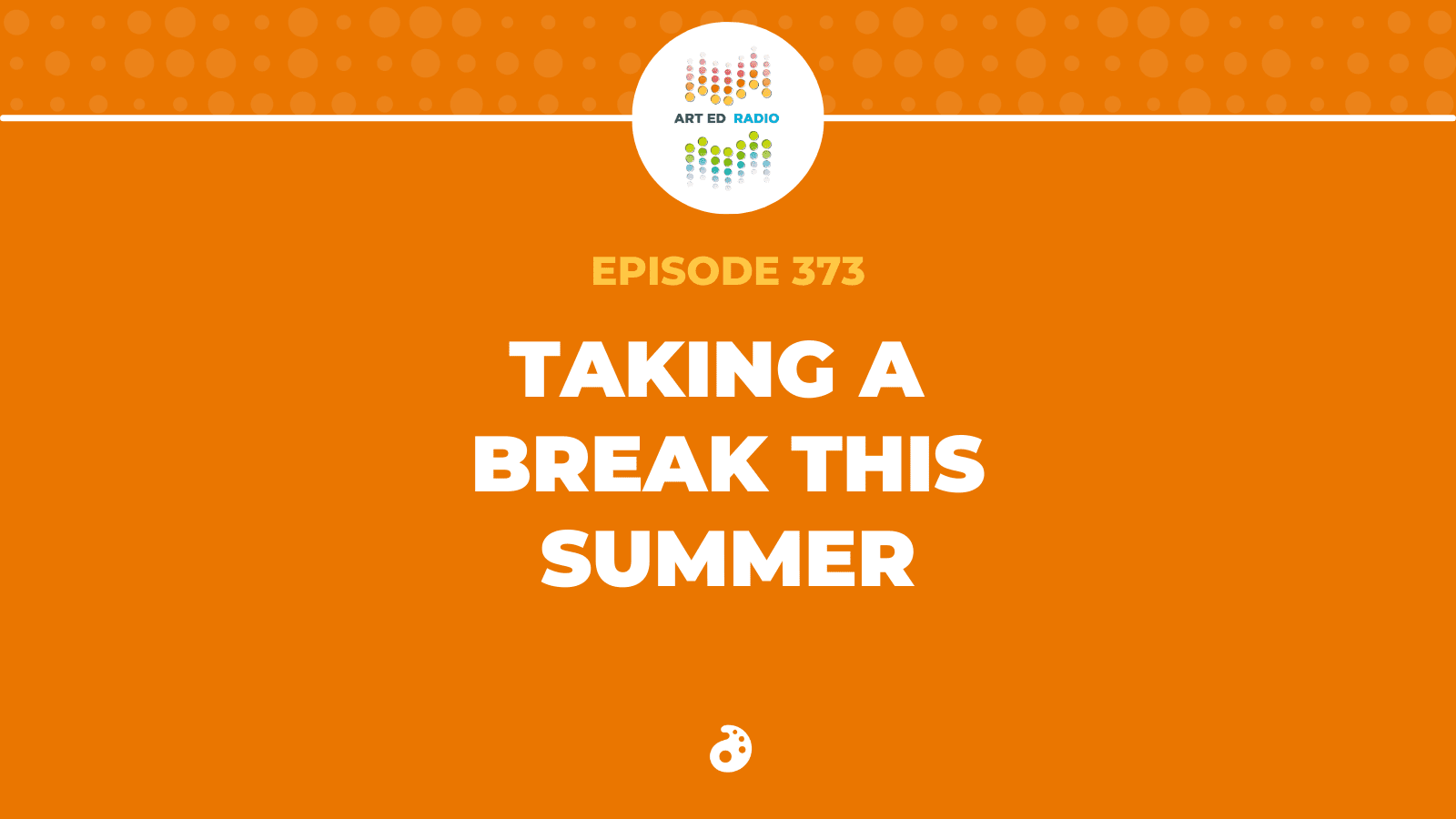
Transcript
Tim Bogatz:
Welcome to Art Ed Radio, the podcast for art teachers. This show is produced by the Art of Education University, and I’m your host, Tim Bogatz.
Now, last week we did the mailbag episode, Amanda and I, answering questions from our teachers from all over the country, and there were a few themes that we just kept seeing from the questions that came in. Just a lot of people are feeling burnt out after this year or after the years that we’ve had recently, and for so many different reasons, teaching is really, really difficult right now. And so I thought that it might be good to reflect on just some of those questions that came in, why we’re seeing so much of that, and what we can do about that. Obviously, I don’t have the solutions to that, but I thought it might be worthwhile to talk today at least a little bit about something that might help, just how we can take a break over the summer, how we can step away from teaching taking over all of our thoughts, determining all of our responsibilities, and just playing such a central role in everything that we do. I think it’s worth thinking about how we can step away from all of that and just relax for the summer. Just take a break for the summer months.
We’ll get to all those ideas in just a little bit. I want to share a story first, just kind of lets you know where I’m coming from on this and I’ll share some of the things that have helped me. Because way back in the day, I don’t know, I want to say this was maybe 10 years ago, I’d been teaching for about a decade and I was into maybe year 8 or 9 teaching high school. And I had been feeling tired of my job for a while, it really started to become a drag, it really started to become a drain on me. And we had a specialist come in, they specialized in burnout and they wanted to chat with all of us about whether we were feeling burned, what we could do to prevent that or keep that from getting any worse, I guess.
And one of the things they did, these two presenters, specialists, whatever you want to call them, they’re there for a PD day, one of the things they did was they had us take a quiz about burnout. Just a lot of questions, how do you feel about this? How do you react to this when you think of this part of your job, what are your sentiments? And whatever the case may be. And they had grades, you added up by your points. And the closer you got to 60 points, the more you were feeling burnt out and the more they were kind of worried about what may be happening to you, what steps you may need to take to mitigate the effects of burnout.
So we were going around the room and some of my colleagues were like, “Oh, I was at 22.” “Oh, I got 27.” Somebody got a 34, which was really kind of bad. And then they looked me and I had scored 57 out of 60, which not ideal. So when I said that the whole room just kind of went silent and stared at me for just a little bit, that was a little awkward. But then one of the presenters, we need to talk. And so they pulled me aside after their presentation and sort of reiterated to me how important it was to step away from teaching and take a break for a little bit in order to reenergize and recharge.
I don’t know where you might be on that scale, whether you’re at a 57 or 51 or whether you’re well beyond 60 and have been for a while. But I think that for a lot of people, they are at that point where it is time to step away and take a break. And I think it’s important that we do that because it can be really easy to just go into that summer and you teach summer school and then you do some curriculum writing and then you help out at a day camp, you do a little bit of PD and then all of a sudden the next school year is starting and you don’t know where the summer went.
And I think as teachers, we always have this habit of always being busy, of always working to get better. And if you need to hear this message, I’m here to tell you, you don’t have to do that. You don’t have to do that this summer. And you can give yourself permission to take a break. You can give yourself permission to forget about school for a couple of months. I think that we as teachers need to take care of ourselves and taking care of ourselves starts by putting your own needs first. And there are a lot of teachers I know that feel guilty about doing that. They feel guilty because they think that putting yourself first is selfish, and it’s not selfish. Honestly, it’s essential if you want to keep enjoying your job as a teacher. If you want to be your best self, it is essential to put yourself first. It’s healthy to put yourself first.
So when those things are asked of you to help at a day camp or to fill in for summer school or to do some sort of curriculum writing, it’s okay to say no. As Amanda said last week, as she says all the time, no is a complete sentence. But if you feel like you need to explain, you can say, “Hey, I’m taking this summer for me,” or, “This summer is for my family,” or whoever. But it’s okay if the summer is not for your teaching or your professional development.
And another part of that, along with the guilt that comes with putting yourself first, which like I said, we need to get over, I think a lot of teachers are so used to being busy that they don’t know how to relax. They don’t know how to step away. They don’t know how to take a break. And I would just say that if you are one of those people, I would encourage you to take this summer to figure out how, figure out how you can relax, how you can take a break. It’s helpful I think, step one here, to figure out what recharges you and create a routine around it.
A few years back when this all started happening, when teaching got really, really difficult, first part of the pandemic, and then as we were still sort of navigating our way through how exhausting that all was we had a keynote presenter at the now conference named Dr. Saundra Dalton-Smith And her specialty, her research was all about the seven types of rest. And oh my goodness, did that hit hard for so many people. Just figuring out what type of rest they needed and how they could recharge. Okay, because as Dr. Dalton-Smith always says, it’s not just about physical rest, there is emotional rest, there is social rest, there is mental rest. And if you’re not familiar with those, I would encourage you to look into them because doing a little bit of research and a little bit of reflecting on those types of rest and applying that to yourself, figuring out what types of rest you might need can be incredibly helpful. And then that’s when you can figure out, like I said, what recharges you and you can create your routine around it.
So for me personally, I need more solitude. I need to spend time alone. As much as I love my family, as much as I love my friends, I need time by myself and that’s what recharges me. Other people recharge by spending time with their friends, spending time with their family, and making those connections. And I want to talk a little bit more about connections later on. But just think about are you somebody who needs solitude to recharge? Are you somebody who needs to be around other people in order to recharge?
Okay. And just going beyond that rest, I think one thing that can be really helpful is to just practice a healthier diet. It’s easy to do over the summer and you get into the habit it can flow into the school year, you can take advantage of how available fresh fruits and vegetables are. Like hit up your farmer’s market, cook some healthier meals, or figure out how to get your body moving if you can do that and do a yoga class or a spin class or whatever you’re interested in, or just get out and go for a walk. If any of that resonates with you and you feel like any of that is something that can help you recharge, do more of that this summer. And there’s so many ideas out there of things you can do. Like I said, you just have to figure out what resonates with you.
And as I was thinking about this, I remembered an old article that Abby Schukei had written, I want to say 2018 or 2019, but it’s called Why You Should Focus On Yourself this Summer. And she has this list of ideas on things you can do to help you focus on yourself, to help you recharge, to help you enjoy your break. And so I want to just read this list of 15, and as I do that I want you to think about what are two or three off the lists that maybe interest you, that may help you get started on relaxing and recharging. So here’s a list of 15 from Abby.
Read for fun. Be a student and learn something new for you. Sleep in and don’t feel guilty. Volunteer in your community. Try something new you’ve always wanted to do. Spend time alone doing the things you love. Don’t work on anything school related. Spend your time at the beach or pool. Take an adventure in nature. Work an odd job not related to teaching. Don’t go to your school. Listen to your favorite band or go to a concert. Don’t lesson plan. Check out a local art gallery. Make art for yourself.
So like I said, any of those 15 can be incredibly worthwhile. So think about, like I said, two or three that you hear that and you go, “Oh, yeah. Yeah, that’s a good idea.” Then dive into that. And they’re all… Not all, almost all, pretty easy to do. So we’ll link to that article in the show notes if you want to check that out a little bit.
But I want to talk a little bit more about one of those things, not necessarily a gallery, but one of my favorite things to do during the summer is to visit an arts festival. And I wrote an article about this a while ago, but I really feel like every teacher should visit a summer arts festival if that opportunity presents itself. And honestly, as I’m recording this, I’m looking forward to the Omaha Summer Arts Festival that’s coming up this weekend. Because, honestly, almost all of those are going to be a great time. There’s food, there’s entertainment, most importantly there’s art. And all of those things can help you recharge and refresh, exactly the things we should be doing over the summer. And if it can help you get inspired to make art yourself, get some ideas to take back to your kids, help your students, maybe all of the above and so I think that’s always worthwhile. And a lot of times I will find that at an arts festival by seeing a demonstration.
One of my favorite things is just watching artists work. And so when you’re at an arts festival, there are usually so many artists who are working throughout the weekend or throughout the days that the festival’s going on and you can sometimes find some really cool stuff. It could be potters throwing on the wheel, you could see some metal-smithing or some glassblowing. But even if it’s just portraits or even caricature artists, all of those things are really cool to see. And it’s fun to see that in action. So you may want to watch, you try and learn, but in any case, it’s going to be enjoyable. And if you are wanting to learn, don’t be afraid to talk to the artist. You can probably find out more about their technique. You may want to chat with them about how you could do it with students.
But I would say for the most part, artists want to engage. They’re happy to talk. They love to share what they’re doing. Especially if they find out that you’re an art teacher, they’re almost always happy to talk shop. And so, you know, can just hit them up at their booth and say, “Hey, I love the work. Can I talk to you about this? Can I ask you about how you do this or that?” And that conversation is always going to be worthwhile for you. They’re probably going to love it. And who knows what you’re going to learn.
And if you have the chance while you’re at the arts festival to actually make some art yourself, I would encourage you to do that as well. Usually you find so many art making booths. It’s usually just a simple fun thing that you can do working with pastels or clay or I’ve finger painted at a booth before. Even though that seems frivolous, even though it seems silly to do, it’s enjoyable, it’s fun, it’s worth it. And even if you don’t want to do that, you could at least bring your sketchbook. There are going to be amazing street scenes that are going to give you inspiration. There’s people watching. Just so much that you can capture, which is always just a great opportunity for you to continue to make art.
I think that plays into a bigger thing too, because a lot of times when it comes to taking a break or finding time to relax, we can dive into that art. And now, if you’re in the head space where it feels like work to create, and you don’t want to do that, then don’t do that. But I know for so many teachers, we lament the fact that we’re not able to make art as often as we want to or have the time to work deeply on projects. And so if you can find the time to do that, maybe it’s inspired by that arts festival you went to, or maybe you just schedule some time in your afternoon to do some creating. All of that is going to be really worthwhile for you.
And if you don’t want to make art, find another hobby, find something else that you want to do. For me, I love running. This summer I’m doing some gardening. And for you, it could be knitting or yoga or cooking or literally anything. Anything that allows you to focus on something that’s not related or maybe just tangentially related to your professional career.
And I don’t know, just a couple other thoughts that I’m thinking of apart from what you can do just hobby wise. I love diving into my reading list over the summer. I just finished a book called The Art Forger by Ba Shapiro. I was going to say highly recommend, but I’m going to take out the highly. I’m just going to say I recommend The Art Forger. It’s good. It’s all about this artist who is great at copying artworks, and she has the opportunity to get a solo show, like a breakthrough show, if she creates a forgery of a Degas painting. And so anyway, it’s all about the sort of tension that comes with all of that, as you can imagine, and the intrigue that goes into the underworld of art. But it really dives into all sorts of great explanations of some of the techniques that art forgers use, which I thought was really cool insight of this fictional story. But yeah, it’s like I said, not highly recommended, but worth a read if you’re looking for something.
But, I guess the bigger point is just read what brings you joy. If you’re diving into your reading list, don’t go over the latest education book or whatever your principal might’ve assigned to you, that can wait until the next school year. Find some books that you really want to. Maybe they’re art related, maybe they’re a murder mystery, maybe something else entirely. Just find something you really like and dive in.
And the other thing I was thinking about, maybe the biggest thing, is something I mentioned earlier, the idea to reconnect. And I think maybe the best part of taking a break over the summer is just having the opportunity to foster connections. All of those relationships that you have outside of school are essential. Those are what would keep you going. Those are what support you outside of the school building. And so I’d encourage you to prioritize those connections. Whether you want to collaborate with some friends on an artwork or take your family to a museum or the summer arts festival or just a day out, then that would be amazing. You can talk to your friends about volunteering with you if you want this to be art related. Add an arts organization or museum, you could teach some workshops to kids or volunteer art making with adults in the community if that’s something that interests you.
And even if it’s not art related, you can just invite your friends and family to share what you love and spend quality time with the people that you want to spend time with. And building on all of those connections is something that is incredibly refreshing and will support you throughout the year. And so I think if I were to tell everyone to do one thing, it’s to make those connections. Reconnect with the people that are important to you.
And one thing that I’m looking forward to, and I know we’ve said stay away from work, but I think at the end of the summer, I think the NOW Conference is my favorite place to connect and reconnect with other art teachers. And if we’re talking about when you’re ready to dive back into school, when you’re ready to start thinking about school again at the end of July, I would really encourage you to come to the NOW Conference. I love hearing from other teachers. I love our kickoff where we’re playing games and connecting and making art and having fun. And then the day of the main event, when we have 1,000, 2,000 art teachers all in the chat, all talking to each other, sharing ideas, it’s this really, really vibrant community that is a fun thing to be a part of. So, once you’ve taken your break and once you’ve concentrated on those connections, if you want to put those together at the end of the summer when it is time to think about school again, think about that NOW Conference at the end of July.
But until we get there, just two last things of advice. I know we’ve talked for a while here. But we always talk on this podcast about reflection. And I would say if we’re we’re looking at taking a break, one way to do a mind shift is instead of reflecting on what happened this year or thinking about what you want to do differently next year, just try reflecting on summer itself one week at a time. At the end of the week just thinking about what are you happy? What are you thankful you were able to do? What are we doing to take a break, to rest, to relax, reflect on those things and make sure that you’re following through with those ideas that sound good, those things that sound enjoyable, those things that will help you.
I know a lot of people are just saying, “What if I can’t stop thinking about school? What if I can’t take a break?” And I’ve been there, and one strategy that I learned from our favorite PD presenters who talked about burnout to me so long ago, it always feels like the next school year is right around the corner. And a lot of times, especially if you’re a good teacher, it’s really tough to stop thinking and planning. And when you are always looking forward to the next thing, you’re not present in the moment. And so anyway, the strategy that they had given me, and one that I’ve used quite often is just to make one list. Just have a specific notebook or a specific piece of paper or a note in your phone, however you do this. Just make a list of school related questions and school related ideas.
And then when an idea pops into your head, when it starts to take over your thoughts, just write it on the list and then you can put it off until you’re back at the end of July, beginning of August, thinking about school. All of it can wait until then. So all of your questions, all of your ideas, all of your plans, just brain dump them into that notebook, into that knock, into that note. And that idea can help you consider thoughts later while it allows you to move on, concentrate on taking that break and focus on what’s in front of you. So just put all of those school thoughts there, worry about them later, and focus on taking a break for right now.
And in the short term, if you’re doing all of these things, it may not feel like you’re getting better as a teacher, but that’s okay because in the long term, you’ll be so much better off if you take a break and do something or do all of these things if you do those for yourself this summer.
Art Ed Radio is produced by the Art of Education University with audio engineering from Michael Crocker. Thank you, as always for listening, and we’ll be back with you next week.
Magazine articles and podcasts are opinions of professional education contributors and do not necessarily represent the position of the Art of Education University (AOEU) or its academic offerings. Contributors use terms in the way they are most often talked about in the scope of their educational experiences.
